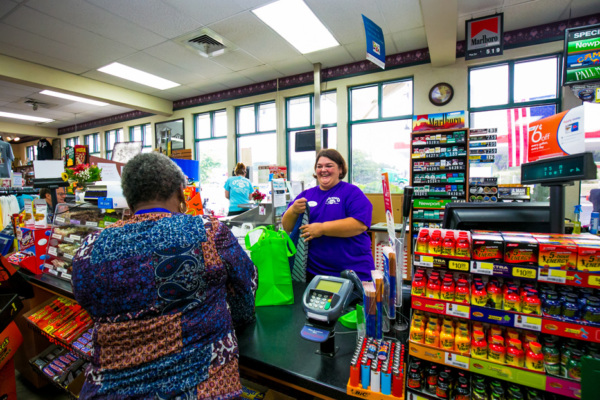Employers, including truckstops and travel centers, across the country continue to struggle with labor challenges and don’t expect it to ease anytime soon.
In an episode of Skip the Line, a Mashgin podcast, host Hilary Kennedy sat down with Schulte along with Mashgin’s Toby Awalt, director of product marketing. “I think the shortage is going to be here for a long time,” said Darren Schulte, vice president of membership for NATSO during the episode.
The labor shortage can impact the customer experience, and poor service can shape customer habits and long-term profitability. “You may or may not frequent that location ever again because of your experience,” Schulte said.
NATSO members said they’re doing everything they can to keep positions filled, but it is a challenge.
“We have increased pay rates quite a bit, tried hiring bonuses, referral bonuses, attending job fairs, drawings to apply, and none have worked at all,” said Cindy Knight, human resources manager for Petro Rochelle. “Unfortunately, we are competing with companies that pay dramatically more than us—warehousing, manufacturing, etc.—so anyone in the labor pool who wants to actually work will go there, and even those places are still short, so we are really left in the cold.”
Johnny Taylor, CEO of the Society for Human Resource Management, said the war for talent is real and worsening. “We have an issue of access to human capital at this point like nothing we’ve ever seen in history,” he said. “You have to constantly be in the business of finding really good talent.”
Ericka Schapekahm, director of human resources and special projects for Coffee Cup Travel Plazas, said the company has been short-staffed most of the time for years because of the low unemployment rate in South Dakota and North Dakota. The rate hasn't gone above 3.0 percent and generally stays around 2.3 percent. While winter months are usually stable, April to November is always a struggle, she said.
“When we stay above market in pay and continue to focus on a ‘team-first experience,' we are best positioned to come out on top. The big difference this year is that the wage war is brutal, and staying above market is harder to keep up with," Schapekahm said, adding Coffee Cup’s long-term core teams have been the backbone of the business during this staffing crisis. “They have found ways to get more done by communicating their ideas and needs to us. They have been dedicated, creative partners in making sure we keep meeting the needs of the guest every day.”
While speaking at a conference in Scottsdale, Arizona, Taylor said that the turnover tsunami is real, with 40 percent of employees looking for a job right now. The U.S. Bureau of Labor Statistics reported that the annual voluntary turnover rate is 25 percent. “It is the new norm for the foreseeable future,” Taylor said.
Due to the wage war, Coffee Cup Fuel Stops’ highest turnover rates are in the first 90 days, so the company focuses on retention and training. “Longer training periods ensure new team members are confident in their roles and feel invested,” Schapekahm said.
Taylor said retaining employees starts with culture. “The best organizations are crystal clear about their culture,” he said, adding that it is worth taking the time to understand and cultivate culture. "If you lose an employee, you're likely going to have to pay more for their replacement, and you don't know what you're going to get.”
Conveying the business’s culture starts before employees even join the company. “You have to be clear in the interview process about who your employees are,” Taylor said. “Be more clear about who their boss is. People leave their manager more often than the job. There are subcultures in our organizations, and we have to work through those.”
Keith Wade, vice president of operations for Dodge City Petro, said the company has undertaken a social media campaign to highlight its long-term employees and help show what it is like to work at the location. “We’re taking a picture of them in their work environment. It doesn’t seem like it is working to put a picture of a Burger King logo up there,” he said. “We’re going to try to say, ‘We've got Miss Etta, who has been here five years.’ Maybe this will make other people want to come and work here.”
For retailers, customer negativity and hostility can make it harder to find workers. Many retailers have found that people are leaving this industry because it is guest-facing and has sometimes gotten confrontational. Many businesses, including Coffee Cup Fuel Stops, have posted signs asking customers to be patient with the staff that did show up to serve them.
“Our signs are the best idea we’ve come up with to try to reach the guest and remind them these team members are human beings, but we continue to see unprecedented levels of confrontation,” Schapenkahm said.
Many workers coming of age right now are entirely turned off by the experience, and seasoned team members are deciding they've had enough. “It breaks my heart because this is a fun job, with lots of different things to do at work, and very upbeat and social,” Schapenkahm said.
Adding Employee Perks
Employee benefits can help attract workers, and today’s employees are interested in a range of perks. Taylor shared several benefits appealing to today’s workers include student loan repayment, tuition reimbursement and open leave. Bonuses, both spot and annual, are in vogue again, and more and more employees see pet insurance as a valuable perk. “People think pets are their children,” he said.
Today’s employees want flexibility. “As quickly as you can, build reasonable flexibility into your workplace. You’re going to be attractive to your recruits,” Taylor said, adding they want empathy. "That is a term every leader has to embrace. It isn’t enough to sympathize with them. You have to try to understand what they experience.”
In July 0f 2021, Coffee Cup Fuel Stops did a “Stay Survey” with long-term team members and leaders, asking them to rank the company’s 14 benefits in order of the value they bring to their lives and to suggest benefits they would value. “As a result of that survey, we added voluntary vision and life insurance for spouses and children,” Schapekahm said. “We also learned that some of the benefits we perceive as valuable are dated and end up towards the bottom of the list.”
At Coffee Cup Fuel Stops, housing is available for full-time leaders and full-time team members. “We initially offered housing in just our Summit location but have grown that offering to all four locations. Housing options depend on location and needs of the team member,” Schapekahm said.
Petro Rochelle has a good benefits package, and its core staff already participates. However, for some, the benefits don't matter. “We're finding that many part-timers who we've offered full-time to cover more hours and offer benefits to don't care about benefits. They would rather work fewer hours and stay on the free state benefits,” Knight said.
Preparing for Long-Term Staffing Challenges
Given all the challenges and outlook for the future, operators are starting to make changes for today and the future. Schulte said many retailers are turning to low- and high-tech innovative solutions. “Maybe they give a discount on gasoline to their employees, help them with childcare, or look at changes in their schedules,” Schulte said, adding that many operators are embracing technology to help re-deploy labor.
Technology can range from point- of-sale equipment for self-checkout to technology that enables vendors to check themselves in to a safe that counts money at the end of a daily shift. “It gives you the ability to get people out from behind the counter to do things during the day helps customer service,” Schulte said.
Coffee Cup Fuel Stops has equipped all of its locations with self-checks to allow the guest faster throughput. “We are using technology anywhere we can to free up time for our teams to focus on the guest,” Schapekahm said. “We have no reason to think staffing will be any less difficult than it is now, so that is what we are preparing for.”
Additionally, Coffee Cup Fuel Stops has already reduced food kiosk hours instead of pushing team members into 60-hour workweeks. The company is also looking at reducing SKUs in heavy labor areas, such as the deli, and focusing on top sellers.
Petro Rochelle is also making changes. "We are re-working things to operate with less staff because people are just not applying, and the very few who do will fail to show up to interview, fail drug screen, fail to show up the first day or only last a few days," Knight said. “We’ve closed cashier stations, adjusted hours of the full-service restaurant, cross-trained people, sharing employees across multiple departments just trying to fill holes. You name it. We’re trying it.”
Coffee Cup Fuel Stops has also worked to improve communication and use of new communication tools that meet team members where they are at, such as Facebook, mobile apps, mobile schedulers and even TikTok.
Subscribe to Updates
NATSO provides a breadth of information created to strengthen travel plazas’ ability to meet the needs of the travelling public in an age of disruption. This includes knowledge filled blog posts, articles and publications. If you would like to receive a digest of blog post and articles directly in your inbox, please provide your name, email and the frequency of the updates you want to receive the email digest.

